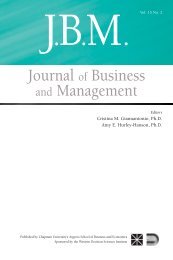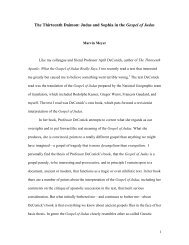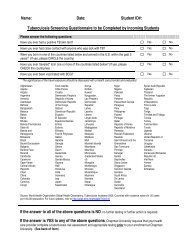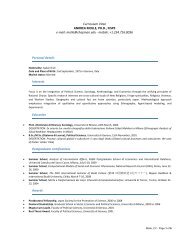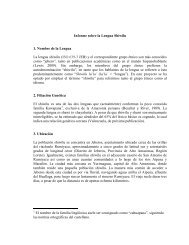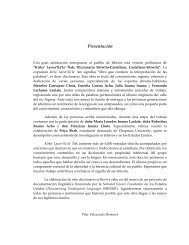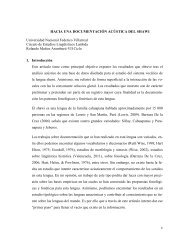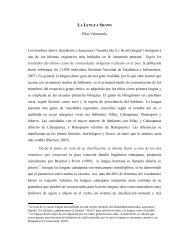“Surplus Humanity” and the Margins of Legality - Chapman University
“Surplus Humanity” and the Margins of Legality - Chapman University
“Surplus Humanity” and the Margins of Legality - Chapman University
Create successful ePaper yourself
Turn your PDF publications into a flip-book with our unique Google optimized e-Paper software.
Do Not Delete 12/12/2010 7:34 PM<br />
14 <strong>Chapman</strong> Law Review [Vol. 14:1<br />
scholarship on endemic crises <strong>of</strong> capitalism, 92 <strong>the</strong> political<br />
economy <strong>of</strong> growth, 93 dependency <strong>the</strong>ory, 94 world systems<br />
<strong>the</strong>ory, 95 accumulation on a world scale, 96 <strong>and</strong> articulation <strong>of</strong><br />
modes <strong>of</strong> production, 97 establishes that primitive accumulation is<br />
―a basic ontological condition for capitalist production, ra<strong>the</strong>r<br />
than just a historical precondition.‖ 98 As a result, ―production <strong>of</strong><br />
value that enters into <strong>the</strong> circuits <strong>of</strong> capitalist accumulation<br />
through parasitization <strong>of</strong> formally non-capitalist processes is a<br />
deeply embedded feature <strong>of</strong> capitalism.‖ 99 These interventions<br />
underscore <strong>the</strong> continuing role <strong>of</strong> coercive political forces in<br />
underwriting <strong>the</strong> purportedly extra-political realm <strong>of</strong> <strong>the</strong> market.<br />
They also alert us that capitalism, since its origins is a global<br />
phenomenon that <strong>of</strong>ten co-opts ra<strong>the</strong>r than displaces noncapitalist<br />
modes <strong>of</strong> production, <strong>and</strong> results in uneven<br />
development <strong>of</strong> different geographical zones within its ambit.<br />
The global geography <strong>of</strong> capitalism enables this accumulation by<br />
extra-economic means through a myriad <strong>of</strong> legal <strong>and</strong> extra-legal<br />
regimes that range from global to local, <strong>and</strong> from formal to<br />
customary. These insights highlight that primitive accumulation<br />
does not lead to complete proletarianization <strong>and</strong> that nonproletarian<br />
<strong>and</strong> semi-proletarian labor remains integral to<br />
capitalism. 100<br />
92 Rosa Luxemburg argued that ―<strong>the</strong> accumulation <strong>of</strong> capital, seen as an historical<br />
process, employs force as a permanent weapon, not only at its genesis, but fur<strong>the</strong>r on<br />
down to <strong>the</strong> present day.‖ ROSA LUXEMBURG, THE ACCUMULATION OF CAPITAL 351 (Agnes<br />
Schwarzschild trans., Routledge 2003) (1913). Hannah Arendt emphasized that crises <strong>of</strong><br />
capital necessitate that ―<strong>the</strong> original sin <strong>of</strong> simple robbery, which centuries ago had made<br />
possible <strong>the</strong> ‗original accumulation <strong>of</strong> capital‘ . . . had eventually to be repeated lest <strong>the</strong><br />
motor <strong>of</strong> accumulation suddenly die down.‖ HANNAH ARENDT, IMPERIALISM: PART TWO OF<br />
THE ORIGINS OF TOTALITARIANISM 28 (1968). David Moore noted that colonized societies<br />
could not ―protect <strong>the</strong>mselves against <strong>the</strong> ravaging international trade <strong>and</strong> imperialism<br />
that destroys precapitalist communities <strong>of</strong> kinship, neighbourhoods, pr<strong>of</strong>ession <strong>and</strong><br />
creed . . . all forms <strong>of</strong> indigenous, organic society.‖ David Moore, The Second Age <strong>of</strong> <strong>the</strong><br />
Third World: From Primitive Accumulation to Global Public Goods?, 25 THIRD WORLD Q.<br />
87, 93 (2004).<br />
93 See generally PAUL A. BARAN, THE POLITICAL ECONOMY OF GROWTH (1957).<br />
94 See generally ANDRE GUNDER FRANK, CAPITALISM AND UNDERDEVELOPMENT IN<br />
LATIN AMERICA (1969).<br />
95 See generally IMMANUEL WALLERSTEIN, THE CAPITALIST WORLD-ECONOMY (1979)<br />
[hereinafter WALLERSTEIN, THE CAPITALIST WORLD-ECONOMY].<br />
96 See, e.g., SAMIR AMIN, ACCUMULATION ON A WORLD SCALE: A CRITIQUE OF THE<br />
THEORY OF UNDERDEVELOPMENT 38 (1974); SAMIR AMIN, UNEQUAL DEVELOPMENT 93<br />
(1976).<br />
97 Aidan Foster-Carter, The Modes <strong>of</strong> Production Controversy, 107 NEW LEFT REV.<br />
47, 51 (1978); Harold Wolpe, Introduction, in THE ARTICULATION OF MODES OF<br />
PRODUCTION: ESSAYS FROM ECONOMY AND SOCIETY 1, 5, 9–10 (1980).<br />
98 Glassman, supra note 81, at 615.<br />
99 Id. at 617.<br />
100 WALLERSTEIN, THE CAPITALIST WORLD-ECONOMY, supra note 95, at 276–78. As a<br />
result <strong>of</strong> articulation <strong>of</strong> dependent economies with global accumulation <strong>and</strong> coexistence <strong>of</strong><br />
modes <strong>of</strong> production, ―no matter how universal <strong>the</strong> process <strong>of</strong> proletarianization, <strong>the</strong><br />
result is not <strong>the</strong> creation <strong>of</strong> a homogeneous proletariat.‖ HARVEY, THE NEW IMPERIALISM,



